
The Rovira i Virgili University (URV) and the Dharma-Gaia Foundation (FDG) announce the opening of registration for the online course "Vajrayāna and Tibetan Buddhism: teachings and practices.", which will run from April 1 to June 26, 2025. This course represents an exceptional opportunity to delve into one of the richest traditions of Buddhism, standing out for its academic rigor, its practical and innovative approach, and its firm commitment to educational excellence.
Vajrayāna and Tibetan Buddhism is a spiritual tradition that combines profound teachings with meditative practices and rituals aimed at fostering personal transformation and inner development. Also known as the "diamond path or vehicle," vajrayāna Buddhism has played a pivotal role in the evolution of the Tibetan tradition, noted for its holistic approach and extraordinary spiritual strength. This course gives participants the opportunity to explore its foundations and essential practices, opening the doors to a deep and transformative understanding.
This online program, designed especially for the Spanish-speaking community, is the fruit of collaboration between Rovira i Virgili University and the Dharma-Gaia Foundation, in response to the growing interest in the study of Buddhism and the great success of previous editions. Buddhist teachings, which have transcended borders and millennia, have left an indelible mark on Asian culture and, more recently, have found a prominent place in the modern world. However, despite its influence on contemporary culture and having inspired countless practitioners around the world, Buddhism remains largely unknown in Spanish-speaking countries and in Ibero-American academia. Aware of this lack, the URV and the FDG have joined forces to open new doors to the rigorous and academic study of Buddhism in Spanish, offering a unique opportunity to delve into this vast and enriching field of knowledge.
In 2021, the two institutions signed a framework cooperation agreement that gave rise to an innovative Buddhist studies program. This program, unprecedented in Spanish-speaking academia, includes academic courses, specialized publications, documentary film production, conferences and a wide variety of educational activities, all designed to foster knowledge and rigorous research on Buddhism.
As for the courses, following the success of the first cycle, entitled "Studies on the traditions of Buddhism and meditation", which ran from September 2022 to December 2023, the URV and the FDG have launched a second, even more ambitious cycle. This new program, composed of four courses independent of each other, is entitled "Buddhism and its traditions: from its origins to its modern interpretations" and will run from April 2024 to December 2025.
The aim of this new series is to offer as complete and comprehensive a view as possible of Buddhism and its constituent traditions. After the extraordinary reception of the first courses in this new series, entitled "Early Buddhism and the Theravāda Tradition: Teachings and Practices" and "Mahāyāna Buddhism and its expansion throughout East Asia" which had more than 60 students each and a very positive evaluation by the participants, the URV and the FDG announce with enthusiasm the third course of the series: "Vajrayāna and Tibetan Buddhism: teachings and practices.". This course will be co-directed by prof, Jaume Vallverdú PhD in Social and Cultural Anthropology and professor of the Department of Anthropology, Philosophy and Social Work of the URV, and Dr. Daniel Millet, president and founder of the Dharma-Gaia Foundation and director of the publishing houses Dharma-Gaia and Unalome. This new academic proposal, as in previous courses, will have the participation of renowned teachers in the field.
This ambitious project opens new doors to a deep and rigorous knowledge of Buddhism, integrating the richness of a millenary tradition with a current and innovative intellectual approach. In this way, it seeks to consolidate an academic space in the Spanish language for the study of this important spiritual tradition, combining tradition and vanguard in the field of thought and research.
The flexible format of the course allows attending live sessions or accessing recordings, adapting to the needs and schedules of students anywhere in the world. This modality ensures an accessible and personalized learning experience.
We invite all interested persons to take part in this educational program, widely recognized for its quality and innovative approach.
Course Description:
This theoretical-practical course has been meticulously designed to offer a comprehensive and coherent understanding of vajrayāna Buddhism, the rich Tibetan tradition and the broader context in which they developed. Throughout the program, we will begin with a detailed exploration of the history and doctrines of Mahayana, establishing a solid foundation for subsequently delving into the origins of vajrayāna in India during the influential Pala period (8th-12th centuries). We will analyze the distinctive features of this tradition, its development in prestigious monastic universities such as Nalanda and Vikramashila, and its subsequent transmission and flourishing in Tibet. In this context, the pivotal role of the Indian mahasiddhas and the invaluable contributions of influential masters such as Padmasambhava, Naropa and Tilopa will be highlighted.
We will then delve into the study of the main schools of Tibetan Buddhism: Nyingma, Kagyu, Sakya and Gelug. We will examine their lineages and the most prominent masters who have shaped these traditions. We will also address the study of Bon, the indigenous spiritual tradition of Tibet, exploring its roots, teachings and its interaction with Tibetan Buddhism throughout history. In addition, a section will be devoted to the Rimé movement, a non-sectarian school that seeks to integrate and preserve the teachings of the different Tibetan traditions, highlighting their relevance in the contemporary context.
We will also delve into essential concepts such as the union of method and wisdom, the visualization of deities(yidam), mandalas, tantras and preliminary practices(ngöndro). The doctrinal explanations will be enriched with the reading of classical texts and excerpts from important tantras, providing a solid historical and philosophical context that will allow participants to understand the teachings in depth.
To complement the theoretical lessons, the course will include practical workshops led by experienced teachers. These workshops will offer the opportunity to participate in specific Tibetan Buddhist meditations. This practical approach will not only promote personal and spiritual growth, but will also foster a deeper and more experiential understanding of the teachings of Tibetan Buddhism and associated traditions.
Language and scope:
It is taught in Spanish and is aimed at students and the general public who are highly interested in the subject.
Duration:
The course, with a total duration of 60 teaching hours (equivalent to 6 ECTS credits), will be taught through the virtual campus Moodle of the URV in weekly sessions of 5 hours, spread over two days and in the afternoon to facilitate the participation of students from different regions.
Dates and schedule:
The course will be held from April 1 to June 26, 2025. The afternoon schedule, from 16:00 to 18.30 (Spanish time), according to the calendar, allows students from Latin America to follow the course.
Location: virtual campus (Moodle)
The course will be taught entirely online through the URV's Moodle educational platform, located on its virtual campus, offering students a flexible and accessible learning experience. The format includes two live videoconference sessions per week, all of which will be recorded and available for the duration of the course, allowing students to view them at any time and adapt to different schedules.
Enrollment:
The course offers a limited number of 50 places, to be filled on a first-come, first-served basis.
The registration fee is 180 €.
Enrollment:
Find here the link to the registration form
Admission requirement:
The only requirement for admission to the course is to have passed the secondary school level, with no previous experience in Buddhist studies.
Requirements necessary to meet completion requirements:
- A minimum of 70% online attendance.
- Delivery of a final essay of approximately 2000 words.
Certifications
A certificate of achievement will be awarded to participants who successfully complete the course. A certificate will be issued to students who have completed the four stand-alone programs "Buddhism and its traditions: from its origins to its modern interpretations", taught between April 2024 and December 2025.
Course objectives
To know the history and cultural context of the vajrayāna tradition and Tibetan Buddhism.
Learn the philosophical, doctrinal and practical foundations of Vajrayāna and Tibetan Buddhism.
Explore and experience the basics of meditation in Tibetan Buddhism.
Academic Management
Jaume Vallverdú
Daniel Millet
Faculty
The course will have a specialized and highly qualified teaching team in Buddhist teaching, guaranteeing a rigorous and enriching training.
Course faculty

Agustí Pàniker Vilaplana is director of the Kairós publishing house, essayist, lecturer, and a great scholar of India and world religions. He is a professor in several university masters, including the Master of Religions and Societies of the Pablo Olavide University (Seville). He has also taught on the Master's Degree in History of Religions at the UAB-UB, on the Master's Degree in Asian and Pacific Studies at the UB and on the Master's Degree in Immigration and Intercultural Education at the UB. He is the author, among others, of the books: Jainism. History, society, philosophy and practice (Kairós, 2001); Índika. Una descolonización intelectual: reflexiones sobre la historia, la etnología, la política y la religión en el Sur de Asia (Kairós, 2005); Los sikhs ( Kairós, 2007); El sueño de Shitala. Journey into the World of Religions (Kairos, 2011); The Caste Society: Religion and Politics in India (Kairos, 2014) and The Three Jewels. The Buddha, his teaching and the community (Kairos, 2018). He has written numerous articles in university publications and popular magazines on different aspects of societies, traditions, religions and cultures of the world.

Ferrán Mestanza García, a graduate of the Brown University School of Public Health and an outstanding student of the renowned Catalan Tibetologist Ramon Prats, has built a solid career combining Buddhist studies and classical Tibetan with contemporary practical applications. As a teacher at the Centre de Mindfulness in Barcelona and a translator specializing in Buddhist texts, he has managed to build meaningful bridges between traditional Tibetan wisdom and the needs of modern society. His work at Wake Up Barcelona and his dedication to making mindfulness practices based on Buddhist teachings accessible to Buddhist and non-Buddhist practitioners alike reflect his commitment to authentic dharma transmission in contemporary contexts, establishing him as a respected figure in the field of Buddhist and Tibetan studies.
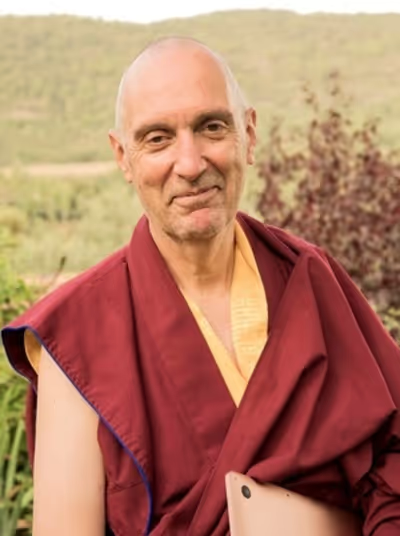
Venerable Karma Tenpa received in India, in 2005 and 2007, the usual ordinations of the Tibetan monastic tradition, conferred by H.H. Kenting Tai Situpa. His Buddhist training includes Mahayana and Vajrayana teachings received from masters such as Dzigar Kongtrul Rinpoche, Sangye Nenpa Rinpoche, Ringu Tulku Rinpoche, Lama Drubgyu, Lama Sonam, Lama Kelsang and Lama Rinchen. Since 2008, he participates in a continuous training of study, practice and retreats under the guidance of Jetsunma Khandro Rinpoche, complementing his learning with collective retreats and, mainly, solo, accumulating more than three years in periods of varying lengths. He currently resides in Madrid, where he teaches at the Kagyu Dechen Ling Buddhist Center, linked to the Dag Shang Kagyu Center of teachings and retreats, in Huesca, Spain. He also teaches in other Buddhist centers and in various fields, addressing topics such as Buddhist philosophy, mindfulness meditation and compassion, integrating the Buddhist tradition with contemporary sciences.
Since 2012, his interest in the dialogue between Buddhism and modern sciences has led him to specialize in Mindfulness and compassion, neuroscience of meditation and accompaniment in the dying process. He is the founder of the "Welcome to your mind virtual community", where he shares teachings on mindfulness and compassion applied to everyday life. He is also the creator and manager of the NGO "Growing up in Nepal"(creciendoennepal.org), dedicated to supporting girls and adolescents in Kathmandu, Nepal, providing them with resources for their growth, education and personal development. You can follow his work and teachings through his website(www.karmatenpa.com), Instagram (@karma_tenpa) and Facebook (Karma Tenpa).
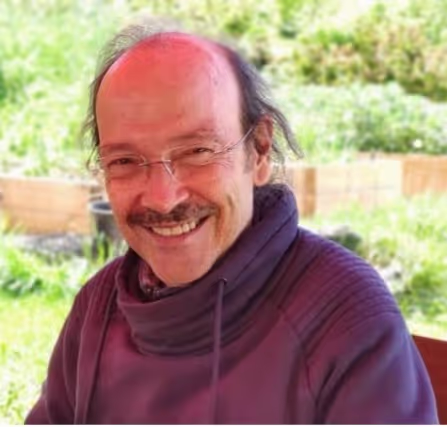
Dr. Elías Manuel Capriles Arias. From 1993 to 2003, Professor Elías Capriles held the Chair of Oriental Studies at the Faculty of Humanities and Education, Universidad de Los Andes, Mérida, Venezuela. In 2003 he joined the Center for African and Asian Studies, Faculty of History, of the same Faculty and University, where he taught Philosophy and various electives (specifically, Buddhism and Asian arts). In addition to teaching university classes, Dr. Capriles is an instructor of Buddhism and Dzogchen certified by the Tibetan master of these disciplines, Chögyal Namkhai Norbu; in this field he has taught in several countries in Europe and America. He lived in the Indian subcontinent from 1973 to 1983. Having received dzogchen teachings from various masters, between 1977 and the end of 1982 he spent most of his time practicing dzogchen in retreat huts and caves in the high Himalayas.
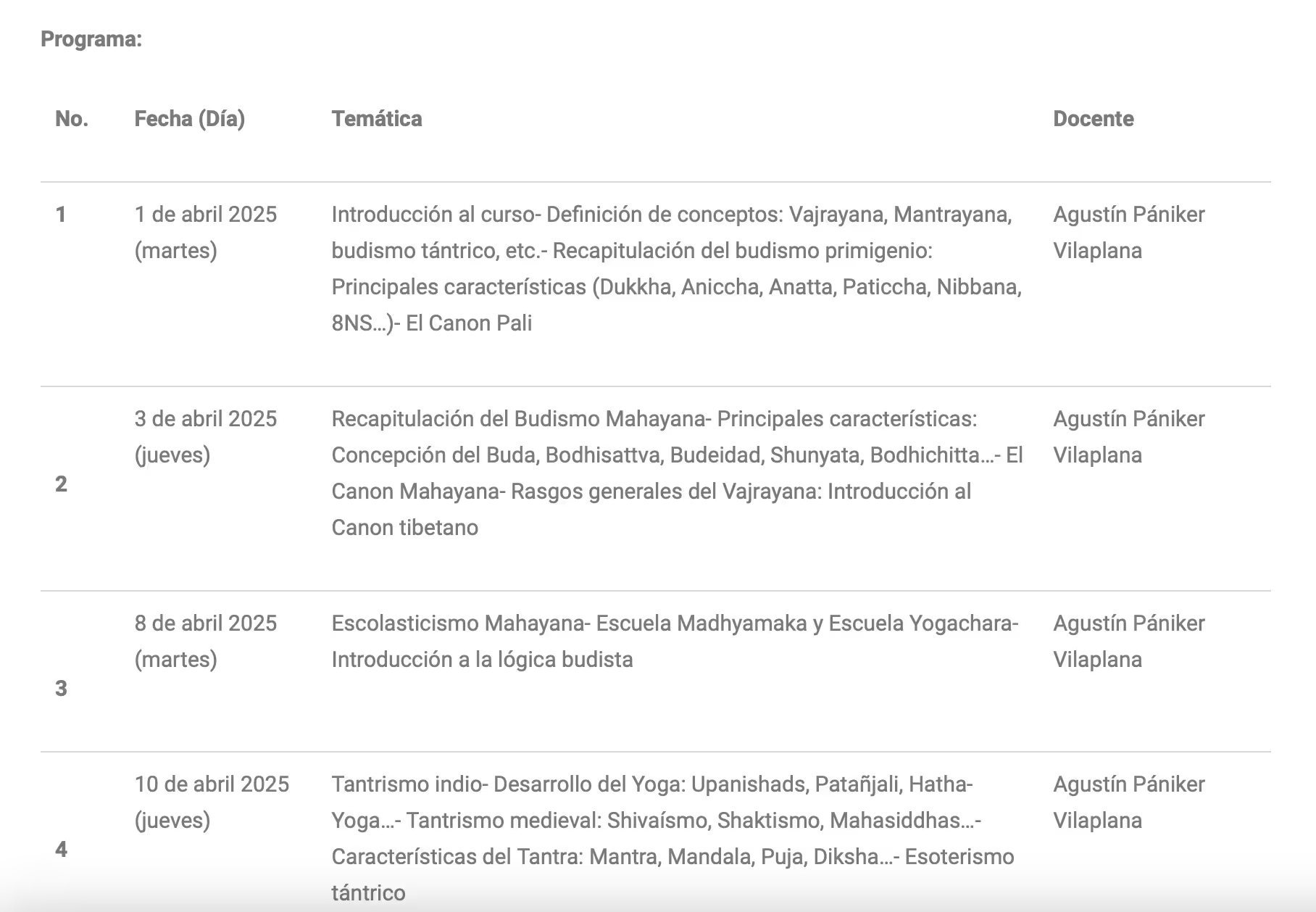

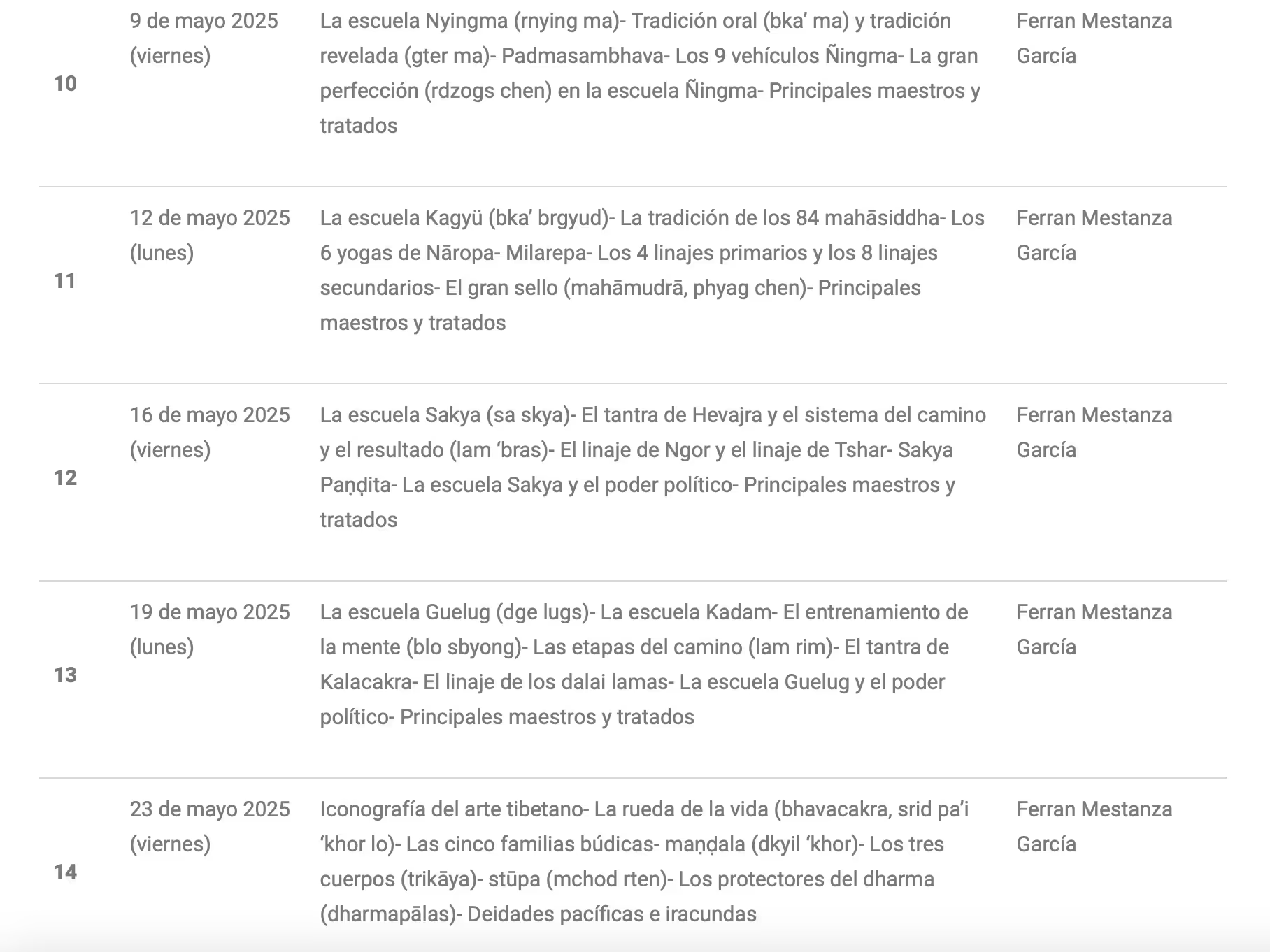


As a result of this fruitful collaboration between FDG and URV, the following has recently been published Buddhist Studies in Latin America and Spaina two-volume academic work that aims to expand knowledge of this ancient tradition in the Spanish-speaking world. This work was edited by Professor Jaume Vallverdú, PhD in Social and Cultural Anthropology and professor of the Department of Anthropology, Philosophy and Social Work of the URV, and Dr. Daniel Millet, president and founder of the Dharma-Gaia Foundation. Co-published by Publicacions Universitat Rovira i Virgili and the Dharma-Gaia Foundation, this work brings together the contributions of leading specialists in the field of Buddhist studies in Spanish, consolidating itself as a key resource for research in this field of study. Both volumes are available in PDF format and can be downloaded free of charge through the following links first volume and second volume.
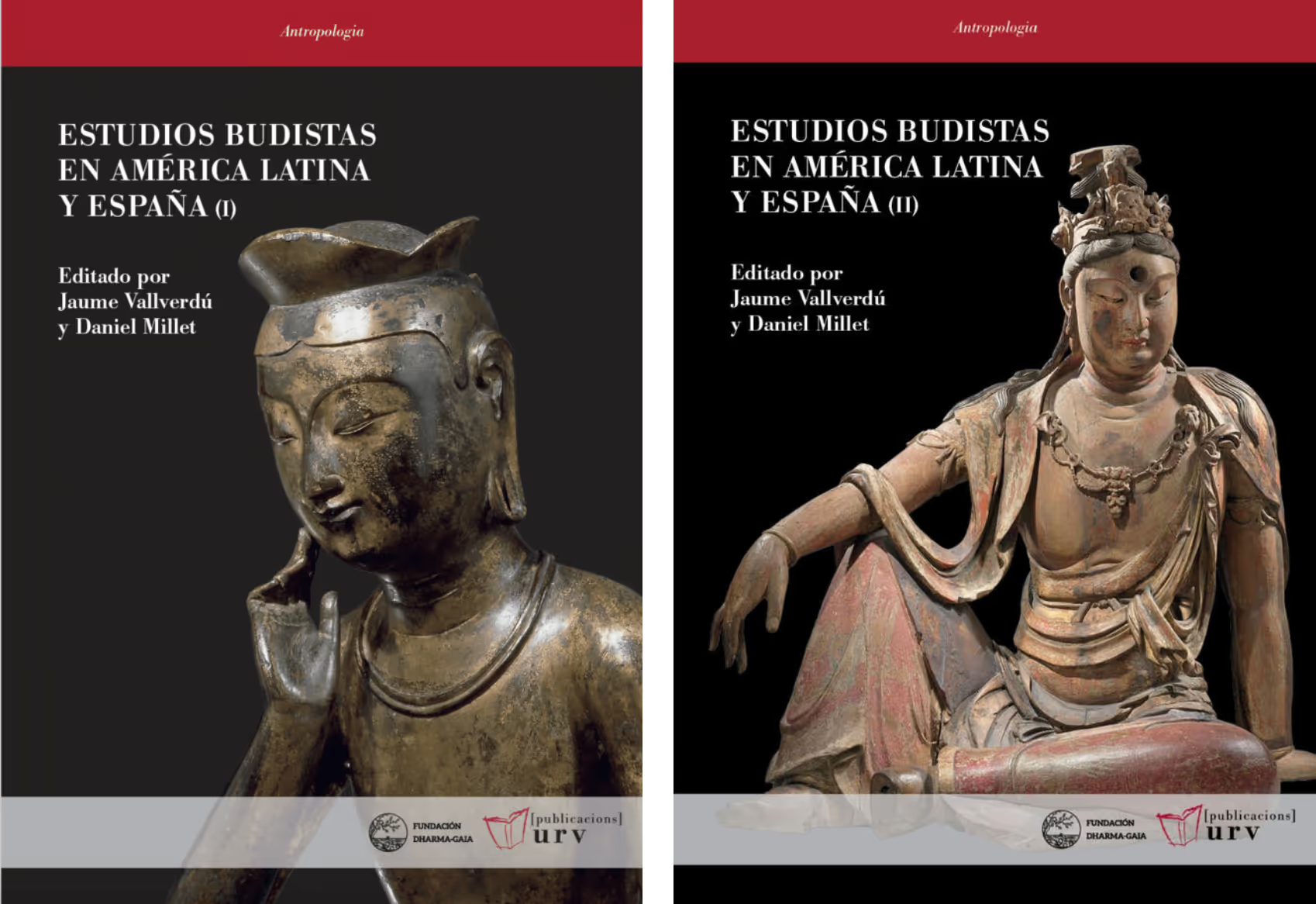
We invite you to be part of this enriching educational experience and to discover the depths of Vajrayāna and Tibetan Buddhism. For more information and to register, visit the URV Foundation website or contact Cristina Jacas at cristina.jacas@fundacio.urv.cat.
This course is an open door to a world of knowledge and personal transformation. Embark on this journey and discover the power of vajrayāna Buddhism to enlighten your life. We look forward to welcoming you to this unique experience!
Links of interest:
Rovira i Virgili University 2020 presentation video
Artículos publicados en Buddhistdoor en Español
"The situation of Buddhist studies in Spain: the teaching programs."by Juan Arnau
Navarro, Montse Castellà Olivé, Francisco Díez de Velasco, Ricardo Guerrero Diáñez, Basili Llorca Martínez, Daniel Millet, Agustín Pániker Vilaplana, Aleix Ruiz Falqués, Jaume Vallverdú Vallverdú, Abraham Vélez de Cea.
Other related articles published in Buddhistdoor in English
"Interview with Agustín Pániker, director of Editorial Kairós."by Daniel Millet.
"The dreams of perfection. Buddhism and transhumanism. Interview with Jaume Vallverdú". Daniel Millet










